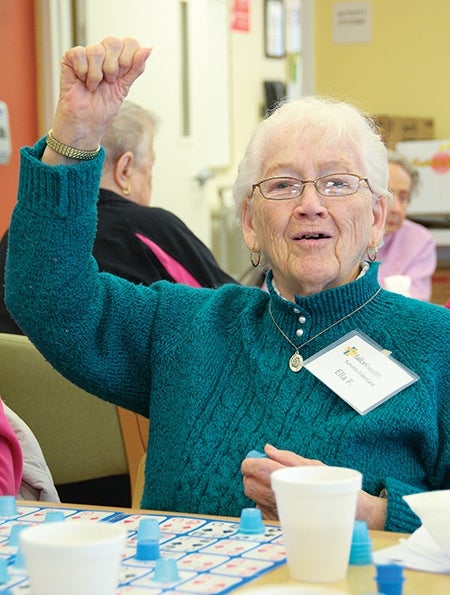Stemming the costs of elder care
 Edd Cote
Fallon Health's Senior ElderCare PACE program offers social activities like Bingo! in addition to fitness. Here, participant Ella Fallon hits Bingo!
Edd Cote
Fallon Health's Senior ElderCare PACE program offers social activities like Bingo! in addition to fitness. Here, participant Ella Fallon hits Bingo!
Economically, at least, a lot of the focus has been on Millennials as the age group to consider in regard to marketing trends, an alternate work ethic and shopping habits, but another population is growing at a pace to exceed the number of Millennials: seniors.
The U.S. Census Bureau estimates that those 65 and older will make up 25 percent of Massachusetts residents by 2030 – just 14 short years away.
Knowing medical costs will grow right along with the number of elders, healthcare organizations are rallying by keeping more nursing-home-eligible seniors in their own homes with more integrated supports and streamlined resources, which – happily – coincides with seniors’ wishes to stay in their homes. Many health insurers in or serving elders in Central Massachusetts are putting innovative prevention programs in place, such as the PACE program offered by Worcester-based Fallon Health.
A healthy PACE
PACE, or Program of All-Inclusive Care for the Elderly, is administered by MassHealth and Medicare (MassHealth). Its goal is to keep seniors living on their own by giving them the tools and supports they need to stay safe and healthy.
A 2014 MassHealth study showed PACE participation slowed nursing-home entry by an average 20 months. Among local providers, Fallon was out in front early serving seniors with its Senior ElderCare PACE program, which celebrated its 20th anniversary in 1995.
“In 1995, very few states had PACE programs,” said Richard Burke, Fallon president and CEO. “As it pertains to Massachusetts … In the mid-1990s, Fallon was the only [organization to have it] outside of Greater Boston.”
In 2004, Fallon was asked to help lead program diversification efforts, expanded, and now operates seven sites (two in Worcester and one each in Charlton, Leominster, Springfield, Lowell and Buffalo, N.Y.) serving 1,000 enrollees, Burke said, the largest PACE program in New England.
Based on income, some PACE members pay a monthly premium. For those who are eligible, it’s covered by Medicare and Medicaid (known as MassHealth). Services are also available on a private-pay basis.
With a typical nursing home priced at $10,000 a month, Burke said PACE is less expensive and streamlined.
“It’s state and federal in one package, and we manage from within,” he said. “We become their insurance. We take on the risk.”
Cross-referencing
PACE provides interdisciplinary health specialists who get to know each patient, their medical issues, living arrangements, medications, etc.
Team members vary according to the patient’s needs, said Kristine Bostek, vice president of senior care services at Fallon. The team is comprised of a primary care physician and nurse, perhaps a social worker, occupational therapist, home-health aide, dietician or transportation staff member. The approach is completely customizable.
“Somebody comes in, and we create a care plan – both physical and social – and decide how often we incorporate the caregiver into their schedule. When someone has an episodic event [such as a fall], they may need more services. They may increase time with a therapist,” Bostek said. “Once they are back to their baseline, we go back to their original schedule.”
The Fallon PACE centers are places to not only see healthcare providers but also get specialized care, rehabilitation therapy and social service assistance. Some members come only for appointments, other come for the daily coffee social, computer access, outdoor recreation, group discussions and more.
Tufts’ dementia supports
Tufts Health Care, with 105,000 Massachusetts clients, has 2,000 customers in its Senior Care Option and has had a Medicaid focus for decades, said Patty Blake, senior products division president.
In addition to meeting regular medical needs of older people through its Medicaid Advantage program, Tufts works to tackle an area that can unfortunately come along with an older population – dementia – through a unique partnership with the Alzheimer’s Association of Massachusetts. Dementia can go beyond a diagnosis and snowball over time, said Blake, resulting in even more issues and costs.
“Dementia or Alzheimer’s will multiply other things, like how a patient takes their meds, follows doctor’s orders or goes to appointments – all can be impaired,” said Blake. “It’s becoming a huge problem … a challenge for those who are diagnosed and their families. The longer people live, the more we’ll see this as an issue.”
Accessibility to wellness initiatives and preventative care can keep other problems and costs from escalating, she said.
The free Tufts Health program for members includes an in-depth consultation, needs assessment, individualized care plan and follow-up with the patient’s primary care physician, care manager and, of course, caregivers, who are offered resources and support.
In addition to dementia, Medication reconciliation is another area of focus for Tufts – such as when a senior has been hospitalized and additional medication is prescribed, said Blake. Prescriptions can duplicate each other, or counteract with something else the patient is taking.
It can be very, very confusing, for a patient, she said, and it’s important someone is there monitoring, ensuring they don’t have a flare up; and if they do, addressing it quickly, so they don’t end up back in the hospital.
Senior Care Options – in which half of seniors in the program are nursing-home eligible – also has services for housebound seniors, who can have depression, language or socio-economic barriers, among other issues, Blake said. Care teams include a pharmacist, behavioral health clinician, nurse care managers, dementia advisers and geriatric consultants.
Nursing homes not sole solution
There is a growing awareness regarding the cost of health care, especially in nursing homes, said Andy McClure of Senior Whole Health (SWH) of Cambridge, which has about 1,000 clients in Central Mass.
“We can provide services without the member being in a nursing home, and as those in the healthcare community have recognized that demographics are aging, there’s been more interest in Medicare,” McClure said.
The goal is to not only keep patients out of nursing homes, but also lower hospital readmission rates and the number of doctors’ visits, said McClure.
As director of quality improvement, McClure looks to huge datasets to find members who could benefit from intervention. This ensures systems are in place that consistently produce better, measurable results in this arena. SWH combines some PACE program aspects with a more network model of care.
“A lot of what we are trying to do is supplement delivery systems,” said McClure. “We don’t replace the doctors, but support.”
This can mean using data to find patients who aren’t filling prescriptions and reaching out with daily-dose pillboxes, multi-month deliveries or bubble packs where meds are packaged for each day, he said.
Filling in gaps
McClure points to a SWH campaign at the end of 2014, where 500 of 800 women who were overdue for mammograms agreed to go have the exams. Three were diagnosed with Stage-1 breast cancer.
“We facilitated that, got it at an earlier stage for a better outcome,” he said.
As for the 300 patients that didn’t get the scans, they may have had not only language barriers but cultural barriers, said McClure. Some cultures are more fatalist and have reluctance around getting cancer screenings.
“Having a nurse from that culture able to treat that patients really helps with that,” he said..
The national Office of Disease Prevention and Health Promotion projects that more than 60 percent of Baby Boomers will be managing one more chronic condition by 2030. The group also foresees changes in family structure that will lead to fewer family caregivers, rising obesity levels and a shortage of healthcare workers, with less diversity.
“We have to make sure we are managing from a preventative perspective,” said Bostek.













0 Comments